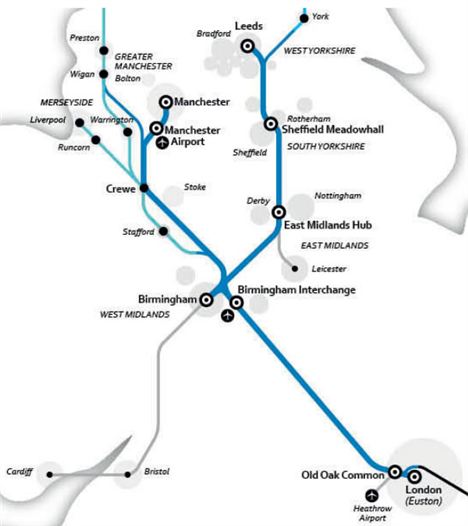LORD DERBY has joined forces with the founder of Home & Bargain, Tom Morris, to call for a £1.5bn rail track to link Liverpool to the HS2 network.
The two are part of a coalition of business leaders and policy experts who have today announced a campaign, called 20 Miles More, which would see an additional 20 miles of track to link Liverpool directly to the HS2 network East of Warrington.
Birmingham
The campaign has published an open letter to Government signed by Lord Derby, urbanist Professor Sir Peter Hall, Tom Morris, Tom Cannon, Professor of Strategic Development at the University of Liverpool Management School, Guy Wallis, founder of commercial law firm DWF, Professor Ian Wray, Trustee, Town & Country Planning Association, Mersey Maritime Chief Executive Jim Teasdale and director of the Respublica think tank, Phillip Blond.
They say it would cost “as little as an additional £1.5bn” to the £42bn overall cost of HS2 and that it would provide a return of £2.70 for every £1 invested, compared to the projected £1.80 across the currently proposed network.
The HS2 plan currently links London with Birmingham, Crewe, Manchester Airport and the city of Manchester with a branch line to Wigan, bypassing Warrington.
The letter states: “Liverpool is vital to Britain’s status as a major trading nation. The city has in recent years experienced a remarkable renaissance and levels of economic growth second only to London.
"Just 20 Miles More rail route is needed to enable Liverpool to play its full part in supporting Britain’s economic renaissance – a small but crucial addition to the 330 mile HS2 network.”
 Lord Derby: Calling for a
Lord Derby: Calling for a
faster way to get to LondonThe campaign claims the link would help Liverpool and the wider city region boost its GVA by £400m a year - worth £8bn over 20 years. Blond, who has been cited as "a driving force behind David Cameron's 'Big Society' agenda, said – “It’s imperative that Liverpool shares in the hugely enhanced connectivity that will be provided by HS2.
“It will otherwise be massively disadvantaged when trying to compete with other cities by relying on 19th century infrastructure, slower journey times and, potentially, reduced passenger capacity.’
Campaigners also point to the £1.8bn being spent on the Liverpool Superport to accommodate the latest Post-Panamax carriers. They say the investment will only realise its full potential if there is a corresponding increase in rail freight capacity engineered by transferring passenger services off the West Coast Main Line onto HS2.
Sense
Andrew Morris, Director of 20 Miles More, said: “An HS2 link to Liverpool will ensure that the economic growth that is very much in evidence in the city will not be jeopardized. It will also greatly assist the Port of Liverpool which is undergoing a massive expansion to handle the latest generation of carriers by freeing up freight capacity on the West Coast Main Line.”
Professor Tom Cannon supported this notion, saying, ‘It makes sound economic sense to include Liverpool on the HS2 network, particularly as the potential return of £2.70 for every £1 invested in providing a branch to the city is greater than that projected for the rest of the network.’
Read the full letter here
Three cities and an economic stranglehold
Liverpool is in fifth place in a list of the top 10 UK cities for the creation of private sector jobs.
Great news, but a study of the 60-page report by London-based think-tank Centre for Cities could just as well as be seen as a “dooms-day” book for the provinces (writes Larry Neild).
For a start London leaves everywhere else standing, but the report points out the combined economies of Manchester and Leeds is higher than the economy for the whole of Wales.
In footballing language London is in the Premier League, Manchester and Leeds are in the Championship and places like Liverpool hover in Division One.
Throw HS2 into the equation and there is every likelihood an economic stranglehold will eventually emerge, with London and the big three (Manchester, Leeds and Birmingham) sucking the lifeblood out of everywhere else.
London is already a runaway train, with nothing able to halt it in its tracks. It attracts millions of twentysomethings every year, following in the footsteps of Dick Whittington in search of fortunes.
HS2 will make that exodus from the provinces even easier. It’s why there are calls for Liverpool to be guaranteed sweeteners to offset the negative impact of 250mph trains from London into Manchester.
Promises that at some time in the future, when anybody reading this will almost certainly be kicking the provincial daisies up, HS2 just might find its way to Lime Street, though by then we may once again be a village.
Mayor Joe Anderson has welcomed the CforC report which shows 12,800 private sector jobs were created in Liverpool between 2010 and 2012. It ranked Liverpool fifth, ahead of Leeds and Nottingham, and just one place behind Manchester.
There’s little doubt Mayor Anderson is well on the way to fulfil his pledge to attract thousands more jobs to the city.
The problem for Liverpool, and other cities, is that London is virtually treated like a state within a state, with King Boris as its head. The Mayor of London has enormous powers, yet even they are not as powerful as those granted to the smaller ‘states’ of Scotland and Wales.
The way to balance things, says Centre for Cities, is for mayors such as Joe Anderson to be given far greater powers, and the right to spend locally raised taxes right here in the city.
Even if the Government agreed to devolve more powers to the provinces, that runaway train called London, would continue.
















